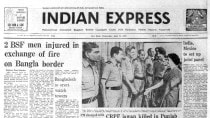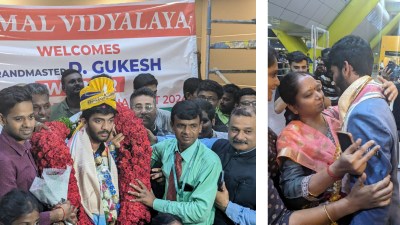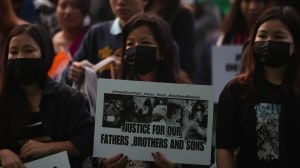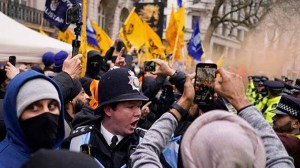- India
- International
Persistence of memory
Despite military victory, Sri Lankan government has not achieved internal integration.
 For the sake of peace, it’s essential that the war is quickly forgotten and the process of inclusive nation-building is catalysed.
For the sake of peace, it’s essential that the war is quickly forgotten and the process of inclusive nation-building is catalysed.
Despite military victory, Sri Lankan government has not achieved internal integration.
Having been an active member of the Indian Peace Keeping Force (IPKF) in northern Sri Lanka 25 years ago, anything associated with the island nation draws my interest. I have continued to analyse the Sri Lankan army’s brilliant military campaign and the handling of the post-conflict dynamics, which are even more essential to analyse than just the strategic and operational aspects of the fighting. Thus a return to Sri Lanka was a high priority, especially at a time of international refereeing on its human rights record. I was to attend an international conference in Colombo and therefore arrived at Bandaranaike International Airport. As I approached the city, I kept my eyes and ears peeled for sights and sounds that could hold clues to Sri Lanka’s post-war confidence. Much as I would have liked to, it was not possible to visit Jaffna or Vavuniya.
The morning papers said much — that a Truth and Reconciliation Commission (TRC), patterned on the lines of South Africa’s, could be set up. A delegation of two ministers was to visit South Africa in the wake of talks between President Mahinda Rajapaksa and President Jacob Zuma. The articles appeared to reflect a fear of the unknown — the possibility of Sri Lanka being censured or, even worse, investigated for the alleged human rights violations towards the end of the conflict with the LTTE. Allegations extend to the killing of over 40,000 civilians during that period. The international community is constantly threatening the Sri Lankan government and even India has refrained from supporting Sri Lanka, due to its own compulsions of Tamil affinity. What is the best personal position to take in such a situation? Much depends on your knowledge of this very long-drawn conflict, the ethics of war and ideas on the definition of national victory.
This conflict started at a time when human rights had not become a by-word in internal conflict. Besides compulsory knowledge of the Geneva Convention, I do not recall any discussion or demarche from our headquarters on human rights issues during the IPKF period of 1987-90. That’s not to say the Indian army violated human rights; it just wasn’t something that mattered then. However, demands are being made today to investigate alleged IPKF human rights violations.
Perceptions do prevail that the Sri Lankan government made many attempts to resolve the conflict, including accepting Indian intervention and, subsequently, Norwegian interlocutorship. However, the UN never considered it a conflict worth stepping into. The LTTE reneged on its promises and utilised the time between ceasefires to strengthen itself. India’s hands-off policy after the unfortunate assassination of Rajiv Gandhi and its inability, or reluctance, to oversee other peace efforts did not help. Perhaps it was with a measure of desperation that the Sri Lankan government empowered the army, gave it full backing and decided to seek a military solution. Military history reveals that rarely have military solutions to such problems succeeded. The question is, has it succeeded here?

Victory in conventional conflict may be easier to define than in internal conflict. The Sri Lankan army strategised effectively, blocking ingress/ egress from the battlezone, employing airpower and artillery, and forcing the LTTE to fight in different locations, thus frittering away its resources. With such a concept, it is impossible to prevent civilian casualties, especially those caused by air and artillery. It is presumed that the army sought clarification on this and the government possibly never considered it in the military terms of reference. Military victory has probably not led to a comprehensive victory that would have spelt the psychological integration of the estranged north and east. While elections have been held, the power of the provincial councils doesn’t appear to reflect trust and integration. The tenor of the media in Colombo remains surprisingly aggressive, almost defiant. A suggestion by one of the provincial councils to introduce international flights to India from Jaffna and Trincomalee was torn apart in rather strong words, reminding Tamils that no international airport existed in these locations and it was not the job of provincial councils to suggest such things.
The proposed TRC is diplomacy’s easiest means of postponing decisions. South Africa had the advantage of Nelson Mandela to oversee and forgive. Such measures can only be adopted when there is a mature polity and a genuine intention to seek trust. Rajapaksa has done yeoman service to his nation and many others by removing the LTTE from Lankan soil. Yet, it’s unlikely that he can be strong enough to accept the fault, if any, of his military. After all, this military victory was achieved only because of the uninhibited backing he gave it. The world may be more kind towards the Lankan government if it sensed remorse and a genuine attempt at reconciliation. This does not seem to be the case, as reflected in the media commentaries that may actually be doing the nation much harm through their hyper patriotism. There’s an air of reluctance, even among the better-placed Tamils in the capital, to discuss the war with relative strangers, especially from India. The fact that the LTTE was one of the most dangerous terrorist organisations in the world, with no qualms about its methods of spreading terror even among its own people, is being forgotten.
That the international community did little to rein it in, or is unlikely to do anything to prevent its resurgence, is not lost on the Sri Lankan people. In such a situation, government outreach to the Tamil people is becoming increasingly difficult. For the sake of peace, it’s essential that the war is quickly forgotten and the process of inclusive nation-building is catalysed. The insistence of the international community to open investigations on war crimes is coming in the way, but that too cannot be easily wished away. Otherwise, the propensity to decontrol militaries in internal conflicts may actually receive a shot in the arm. Amid such complexity, a TRC may actually be the only answer. India’s abstention at the UN Human Rights Council on March 27, from the resolution to investigate excesses during operations, keeps our approach ambivalent and should be read as a message urging greater efforts at integration.
I left Colombo much more confused than when I arrived. While I marvel at Sri Lanka’s ability to transform its urban administration, it is with much regret that I continue to believe it has not seen the end of its internal conflict. Greater forgiveness and magnanimity on the part of the victor is the only way to lasting peace.
The writer is a senior fellow with the Delhi Policy Group, a visiting fellow with the Vivekanand International Foundation and a former member of the Indian Peacekeeping Force in Sri Lanka
express@expressindia.com
EXPRESS OPINION
More Explained
Apr 25: Latest News
- 01
- 02
- 03
- 04
- 05











































